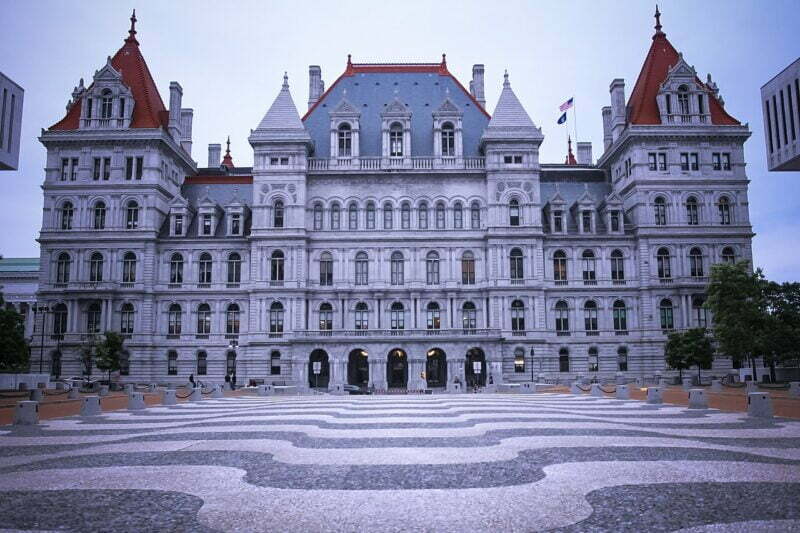NY & CT Foreclosure & Bankruptcy Attorneys
Schedule A Free Consultation 914.472.6202
New York recently passed legislation called the Good Cause Eviction Law. The Law dramatically changes the rights and obligations of both landlords and residential tenants in New York City by capping rent increases, limiting grounds for eviction, and requiring lease renewals to be provided.
What is considered a “Good Cause” for eviction?
Landlords are now prohibited, subject to certain exceptions, from evicting any residential tenant except for “Good Cause”. Under the legislation, Good Cause grounds for eviction include the following:
- Non-payment of rent, unless the rent is deemed “unreasonable”;
- Malicious or grossly negligent substantial damage to the premises or building;
- Illegal use of the premises;
- Unreasonable refusal of access for necessary repairs;
- Failure to agree to reasonable changes to a lease agreement;
- Violation of a substantial obligation of the tenancy;
- Nuisance;
- If the Landlord wishes to occupy the unit as their principal residence;
- Demolition of the Premises;
- Withdrawal of the premises from the rental housing market; and
- If the Tenant’s occupancy violates the law and an order to vacate has been issued.
What are the exceptions to “Good Cause” Eviction?
Even though the Legislation greatly limits the grounds for eviction, numerous exceptions were created that narrow when a “Good Cause” Eviction applies. The following exceptions include:
- Residential units with a monthly rent that is greater than 245% of the fair market rent, as published annually by the United States Department of Housing and Urban Development (HUD);
- Units owned by small landlords, who own less than ten units in New York State;
- Owner-occupied premises that contain less than ten units;
- Residential units already subject to rent regulation according to local, state, or federal law, rule, or regulation;
- Residential units that are required to be affordable for certain income levels under statutes, regulations, restrictive declarations, or regulatory agreements with a local, state, or federal government entity;
- Residential units on or within a building that is owned as a condominium or cooperative, or on or within a building that is subject to an offering plan submitted to the office of the attorney general;
- Evictions involving Tenants that reside in Condominiums or Co-Operatives;
- Evictions involving Tenants that reside in Seasonal use units;
- Evictions involving Tenants that reside in Manufactured homes;
- Evictions involving Tenants that reside in Hotel Rooms;
- Evictions involving Tenants that reside in Units within Hospitals; and
- Buildings for which a Temporary Certificate of Occupancy or Permanent Certificate of Occupancy was issued after January 1, 2009, for thirty years.
Does the Law make any other changes?
In addition to the above, the Good Cause Eviction Law puts a cap on rent increases for residential units. Under the new law, a rent increase is presumed unreasonable if it is above the inflation index or greater than 10 percent, whichever is lesser.
The inflation index is defined as 5% plus the annual percentage change in the consumer price index (“CPI”) unless a higher increase can be justified with proper documentation and reasoning.
In addition to the above, the Good Cause Eviction Law puts a cap on rent increases for residential units. Under the new law, a rent increase is presumed unreasonable if it is above the inflation index or greater than 10 percent, whichever is lesser.
The inflation index is defined as 5% plus the annual percentage change in the consumer price index (“CPI”) unless a higher increase can be justified with proper documentation and reasoning.
Does this Law apply to other areas outside of New York City?
While the Good Cause Eviction Law applies only to New York City, other villages, towns, or cities state-wide may choose to opt in.
Have questions about the Good Cause Eviction Law?
Clair Gjertsen & Weathers PLLC continues to monitor this ever-changing landscape. For additional questions regarding the implications of these decisions and related landlord/tenant issues, we invite you to contact Clair Gjertsen & Weathers PLLC by calling 914-472-6202. We look forward to hearing from you and assisting you in navigating this new law.
The Foreclosure Abuse Prevention Act (FAPA) was signed by Governor Hochul effective December 30, 2022. Since then, the Courts have been split on whether this Act is retroactive.
What does this mean for the borrower on a residential mortgage? It could mean that the bank cannot foreclose based on the 6-year statute of limitations and the mortgage is canceled.
A recent article was posted discussing the New York Courts’ split on the Constitutionality of FAPA by Goodwin on July 7, 2023. https://lnkd.in/eS9NSjuc
Did you know that some student loans are eligible for standard bankruptcy discharge?
Although many student loans are subject to an “undue hardship” standard and require a separate proceeding to be discharged in bankruptcy, some private student loans can be discharged in a standard bankruptcy proceeding, just like most other unsecured consumer debts. For this subset of private student loans, a bankruptcy discharge order eliminates the consumer’s debt.
Some examples of student loans eligible for standard bankruptcy discharge include:
- Loans made to attend schools that are not eligible to receive U.S. Federal student aid, such as unaccredited schools and foreign schools (“non-Title IV schools”)
- Loans to students attending school less than half-time
- Loans made in amounts in excess of the cost of attendance, which are often disbursed directly to the borrower, instead of the school
- Loans made to cover fees and living expenses incurred while studying for the bar exam or other professional exams
- Loans made to cover fees, living expenses, and moving costs associated with medical or dental residency
- Other loans made for non-qualified higher education expenses
Student Loan Lawyers And Bankruptcy Attorneys That Can Help
At Clair Gjertsen & Weathers PLLC, we listen to our clients and empower them with knowledge, compassion, and creative solutions to relieve their financial anxiety and help them achieve their financial and personal goals.
Given the complexities of discharging student loans in bankruptcy, it is imperative to contact an experienced bankruptcy law firm. Clair Gjertsen & Weathers, PLLC is an experienced bankruptcy law firm who has helped thousands of people in financial distress. We understand that student loans can be overwhelming and daunting and we are here to help you through the process. Please give us a call to schedule a free consultation at 914.472.6202.
Foreclosure Abuse Prevention Act (FAPA) was signed into law by Governor Hochul on December 30, 2022.
This law intends to eliminate abusive and unlawful litigation tactics in mortgage foreclosure actions that manipulate the law and the courts in favor of mortgage bankers and servicers. What does this mean for homeowners? This means that the banks will not be able to continually discontinue and recommence a cause of action concerning mortgage foreclosures without strict adherence to New York’s six (6) years statute of limitations.
Clair Gjertsen & Weathers PLLC is available to answer any questions or concerns regarding this recent development as we have decades of experience in defending foreclosures. We invite you to contact us online or at 914-472-6202.
A copy of the bill is available here:
https://lnkd.in/etdKvvwV
With the recent increase in storms that have wreaked havoc in Westchester County by bringing severe flooding and causing incalculable amounts of property damage, the County has passed a new law, called the “Flood History Disclosure Law” requiring landlords to provide any potential tenant with a Flood History Disclosure form regarding the property before the lease is signed.
What changes were made by the Flood History Disclosure Law?
As of August 15, 2022, the new law compels landlords of residential and commercial properties to provide a written notice to prospective tenants or sub-tenants stating whether the property is located in a FEMA-designated Special Flood Hazard Area. The law also requires landlords, to the best of their knowledge, to notify prospective tenants or sub-tenants of any flooding that has caused damage to any portion of the property within the last ten years. This law also requires landlords to notify tenants or sub-tenants that are up for renewal on their lease. To streamline the process, the county has made a form that comports with this law to lessen the already strenuous burden on landlords.
What consequences befall Landlords that do not follow this law?
If a landlord does not follow this law and the tenant or sub-tenant sustains flood damage during their lease, the tenant or subtenant may file suit against the landlord in court for the recovery of such damages.
These changes make it more important than ever to speak with an attorney that is well versed in landlord-tenant matters. Clair Gjertsen & Weathers PLLC is experienced at drafting and negotiating leases to remove any stress from this already complex process. We offer free initial consultations to see how we can best lead you through any leasing matter. Please give us a call at 914.472.6202.
The importance of hiring an Experienced Landlord Tenant Attorney
These changes make it more important than ever to speak with an attorney that is well versed in landlord-tenant matters. Clair Gjertsen & Weathers PLLC is experienced at drafting and negotiating leases to remove any stress from this already complex process.
We offer free initial consultations to see how we can best lead you through any leasing matter. Please give us a call at 914.472.6202.
NY Residential Foreclosure Case
On July 21, 2022, the Supreme Court of the State of New York, County of Kings, granted the Defendants (borrowers) motion for summary judgment in HSBC Bank v. Freda Nierenberg, Reuben Nierenberg, Index No. 504903/2016.
Clair Gjertsen & Weathers, PLLC represented the winning borrowers in this action, and asserted that the bank had improperly sent notices under RPAPL 1304 by including the notice to both borrowers in one mailing. This decision upheld the recent holding made by the Appellate Court in the Second Department in Wells Fargo Bank, N.A. v Yapkowitz, 199 AD3d 126 (2d Dept. 2021).
What changes did Yapkowitz bring to foreclosure?
Briefly stated, the borrowers in Yapkowitz were a married couple that defaulted on a loan secured by a mortgage on their home. The bank sent to the borrowers in one mailing the required RPAPL 1304 notices. After some loan assignments and changes in servicing agents, the bank commenced an action against borrowers. After the borrowers raised the issue of how the bank complied with RPAPL 1304, the lower court ultimately found that the plaintiff(bank) failed to establish its strict compliance with RPAPL 1304, which “requires a separate notice to each borrower in a separate envelope”, and dismissed the foreclosure action. Wells Fargo Bank, N.A. v. Yapkowitz, 59 Misc.3d 1227[A], 2018 N.Y. Slip Op 50726[U], *8.
On the bank’s appeal, the Appellate Court upheld the decision and dismissed the bank’s complaint. The Appellate Court found that “notice cannot be deemed given until the date of mailing, in a separate envelope, of each 90–day “notice to the borrower” (RPAPL 1304[1]), which is read to mean a separate notice to each borrower.
Finally, the Appellate Court also recognized that permitting “a single notice jointly addressed to two or more borrowers and mailed in a single envelope to serve in lieu of a separately mailed notice to each borrower would transform the requisite standard of compliance from ‘strict compliance’ to ‘substantial compliance.’”
Therefore, the Appellate Court concluded that the lower court “properly dismissed the complaint insofar as asserted against the defendants.”
Have you defaulted on your mortgage payments and received RPAPL 1304 foreclosure notices?
You could still have legal rights to your home and potentially claim that the bank improperly mailed the RPAPL 1304 notices to you. Timing is of the utmost importance and you must speak with an attorney with knowledge of residential foreclosure and foreclosure defense.
Clair Gjertsen & Weathers PLLC has been helping people through this complex process for the last 40 years. We offer free initial consultations to see which option is the best fit for you to stop a foreclosure auction sale to keep your home.
Please give us a call at 914.472.6202.






